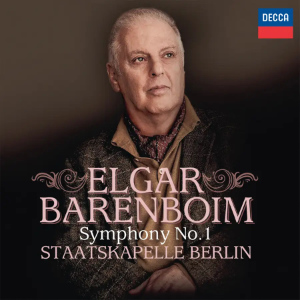
Sir Edward Elgar (1857-1934)
Symphony No. 1 in A flat major op.55
Staatskapelle Berlin/Daniel Barenboim
rec. live, 19 & 21 September 2015, Philharmonie Berlin, Germany
Decca 478 9353 [51]
I have recently been immersing myself in Elgar and having surveyed several notable recordings of this great symphony (review ~ review) going back two generations, I have now been acquainting myself with this account acquired on the recommendation of my colleague John Quinn – and I must say that it has quickly taken its place among versions I esteem. Barenboim has long displayed an affinity with England’s greatest composer and while I have by no means been a fan of all his output –much of which has been so often redundantly duplicated over the years – this recording of Elgar’s masterpiece certainly engages my interest.
The first movement is not actually particularly fast but has an expectant, coiled-spring quality which drives it forward without compromising the grandeur of Elgar’s idiom, and the Scherzo is likewise distinctly urgent – the only version I know being under seven minutes – contrasting with the daringly agogic Adagio, whose affect reminds me of Sinopoli’s similarly individual treatment. I am quite sure that no one uninformed of the identity of the orchestra would suspect that it is anything other than one traditionally associated with Elgar performance; I am swept along by the yearning beauty of their phrasing, crowned by especially lovely playing from the mellow woodwind and horns. The conclusion to the movement is ineffably tender – and further benefits from the superb sound engineering, whereby balances and ambience are ideal. The finale reverts to the kind of nervy, quirky expectancy I always associate with Elgar in exploratory mode and the Staatskapelle Berlin display a capacity for generating real heft at orchestral tutti climaxes. Barenboim drives relentlessly towards a triumphant resolution of which Barbirolli would be proud, the timpani splendidly prominent – but is there perhaps too much of a disjuncture between the fast and slow passages? That judgement is probably just a question of taste. Some find Barenboim too “stop-go, fast-slow” to encompass sufficient subtlety and find his approach “applied”, without true depth of feeling.
As I previously observed, Elgar’s music is surprisingly accommodating of a range of approaches from Solti’s dynamism to Boult’s lean stringency, to Barbirolli’s unabashedly indulgent Romanticism to Sinopoli’s leisurely idiosyncrasy; in both his recordings separated by twenty years, Mark Elder steers a more central course through the middle of extremes. Barenboim manages to impose his own conception upon this symphony but the question is whether that impairs its coherence; I certainly find the result satisfying but he does not displace my favourite versions.
Ralph Moore
Buying this recording via a link below generates revenue for MWI, which helps the site remain free



















